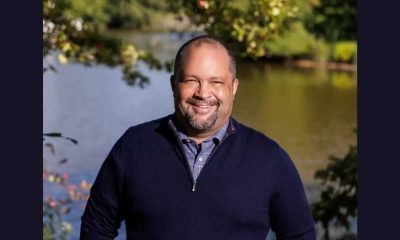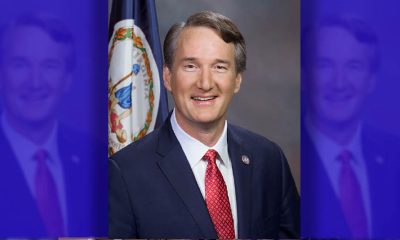Politics
Senate OKs Republican Balanced-Budget Plan, Following House

Senate Minority Leader Mitch McConnell of Ky., center, joined by Senate Minority Whip John Cornyn of Texas, right, and Sen. John Thune, R-S.D., the Senate Republican Conference chairman, speaks with reporters following a closed-door policy meeting on Capitol Hill in Washington, Tuesday, Dec. 2, 2014. (AP Photo/J. Scott Applewhite)
ALAN FRAM, Associated Press
WASHINGTON (AP) — Republicans muscled a balanced-budget plan through the Senate early Friday, positioning Congress for months of battling President Barack Obama over the GOP’s goals of slicing spending and dismantling his health care law.
Working into Friday’s pre-dawn hours, senators approved the blueprint by a near party-line 52-46 vote, endorsing a measure that closely follows one the House passed Wednesday. Both budgets embody a conservative vision of shrinking projected federal deficits by more than $5 trillion over the coming decade, mostly by cutting health care and other benefit programs and without raising taxes.
The Senate was beginning a spring recess after approving the measure, leaving Congress’ two GOP-run chambers to negotiate a compromise budget in mid-April. The legislation is a non-binding blueprint that does not require Obama’s signature but lays the groundwork for future bills that seem destined for veto fights with the president.
“Republicans have shown that the Senate is under new management and delivering on the change and responsible government the American people expect,” said Senate Majority Leader Mitch McConnell, R-Ky.
Democrats viewed the document differently, saying it relied on gimmickry and touted the wrong priorities.
“The budget we passed today is irresponsible and fails to effectively invest in our future,” said Sen. Barbara Mikulski, D-Md.
The budget’s solidly ideological tenor contrasted with a bipartisan bill the House overwhelmingly approved Thursday permanently blocking perennial cuts in physicians’ Medicare fees. It too will wait until April for final congressional approval by the Senate, with McConnell saying his chamber will handle it “very quickly when we get back.”
Though doctors face a 21 percent cut in Medicare fees April 1, the government can delay processing those payments until Congress’ return. The measure, which also provides money for health care programs for children and low-income people, would be partly financed with higher premiums for top-earning Medicare recipients.
On the budget, only two Republicans voted no: Sens. Ted Cruz of Texas and Rand Paul of Kentucky, a pair of presidential hopefuls. Two other potential GOP presidential candidates, Sens. Marco Rubio of Florida and Lindsey Graham of South Carolina, voted yes.
All voting Democrats were opposed.
The Senate completed its budget work after enduring one of its more painful traditions: A multi-hour “vote-a-rama” in which senators repeatedly debate and vote on a pile of non-binding amendments well past midnight. Senators offer the amendments because the votes can demonstrate support for a policy or be used to embarrass opponents in future campaigns.
Those approved included one by Sen. Brian Schatz, D-Hawaii, entitling married same-sex couples to Social Security and veterans’ spousal benefits. It got 11 GOP votes, including from several Republicans facing competitive re-elections next year.
Also adopted was one by McConnell aimed at thwarting Obama administration efforts to reduce coal pollution.
Congress’ GOP budgets both matched the spending plan that Obama presented last month when it comes to defense, proposing $612 billion for next year, a 4.5 percent boost over current levels. Some conservatives were unhappy because they wanted more of the extra military spending to be offset with savings from elsewhere in the budget.
But mostly, the Republican blueprints diverge starkly from Obama’s fiscal plan.
While his leaves a projected deficit exceeding $600 billion 10 years from now, the Senate plan claims a surplus of $3 billion.
Over the decade, Obama would raise $2 trillion in higher taxes from the wealthy, corporations and smokers while granting tax breaks to low-income and middle-class families. He would boost spending on domestic programs including road construction, preschools and community colleges and veterans.
The Senate budget would cut $4.3 trillion from benefit programs over the next 10 years, including annulling Obama’s health care law, a step the president would without doubt veto.
Those savings would include $431 billion from Medicare, matching Obama’s figure. The House budget would pare $148 billion from the health care program for the elderly and convert it into a voucher-like program for future beneficiaries, a step the Senate shunned.
The Senate budget would cut $236 billion from the budgets of nondefense agencies. The House would go even further, slicing $759 billion.
White House press secretary Josh Earnest said in a statement that the Senate-passed budget “relies on top-down economics and gimmicks,” and “refuses to ask the wealthy to contribute a single dollar to deficit reduction.” Earnest said the Senate bill would lock in severe spending cuts “to investments in the middle class like education, job training and manufacturing,” and it fails to “responsibly fund our national security.”
Copyright 2015 The Associated Press. All rights reserved. This material may not be published, broadcast, rewritten or redistributed.
Bay Area
MAYOR BREED ANNOUNCES $53 MILLION FEDERAL GRANT FOR SAN FRANCISCO’S HOMELESS PROGRAMS
San Francisco, CA – Mayor London N. Breed today announced that the U.S. Department of Housing and Urban Development (HUD) has awarded the city a $53.7 million grant to support efforts to renew and expand critical services and housing for people experiencing homelessness in San Francisco.

FOR IMMEDIATE RELEASE:
Wednesday, January 31, 2024
Contact: Mayor’s Office of Communications, mayorspressoffice@sfgov.org
***PRESS RELEASE***
MAYOR BREED ANNOUNCES $53 MILLION FEDERAL GRANT FOR SAN FRANCISCO’S HOMELESS PROGRAMS
HUD’s Continuum of Care grant will support the City’s range of critical services and programs, including permanent supportive housing, rapid re-housing, and improved access to housing for survivors of domestic violence
San Francisco, CA – Mayor London N. Breed today announced that the U.S. Department of Housing and Urban Development (HUD) has awarded the city a $53.7 million grant to support efforts to renew and expand critical services and housing for people experiencing homelessness in San Francisco.
HUD’s Continuum of Care (CoC) program is designed to support local programs with the goal of ending homelessness for individuals, families, and Transitional Age Youth.
This funding supports the city’s ongoing efforts that have helped more than 15,000 people exit homelessness since 2018 through City programs including direct housing placements and relocation assistance. During that time San Francisco has also increased housing slots by 50%. San Francisco has the most permanent supportive housing of any county in the Bay Area, and the second most slots per capita than any city in the country.
“In San Francisco, we have worked aggressively to increase housing, shelter, and services for people experiencing homelessness, and we are building on these efforts every day,” said Mayor London Breed. “Every day our encampment outreach workers are going out to bring people indoors and our City workers are connecting people to housing and shelter. This support from the federal government is critical and will allow us to serve people in need and address encampments in our neighborhoods.”
The funding towards supporting the renewal projects in San Francisco include financial support for a mix of permanent supportive housing, rapid re-housing, and transitional housing projects. In addition, the CoC award will support Coordinated Entry projects to centralize the City’s various efforts to address homelessness. This includes $2.1 million in funding for the Coordinated Entry system to improve access to housing for youth and survivors of domestic violence.
“This is a good day for San Francisco,” said Shireen McSpadden, executive director of the Department of Homelessness and Supportive Housing. “HUD’s Continuum of Care funding provides vital resources to a diversity of programs and projects that have helped people to stabilize in our community. This funding is a testament to our work and the work of our nonprofit partners.”
The 2024 Continuum of Care Renewal Awards Include:
- $42.2 million for 29 renewal PSH projects that serve chronically homeless, veterans, and youth
- $318,000 for one new PSH project, which will provide 98 affordable homes for low-income seniors in the Richmond District
- $445,00 for one Transitional Housing (TH) project serving youth
- $6.4 million dedicated to four Rapid Rehousing (RRH) projects that serve families, youth, and survivors of domestic violence
- $750,00 for two Homeless Management Information System (HMIS) projects
- $2.1 million for three Coordinated Entry projects that serve families, youth, chronically homeless, and survivors of domestic violence
In addition, the 2023 CoC Planning Grant, now increased to $1,500,000 from $1,250,000, was also approved. Planning grants are submitted non-competitively and may be used to carry out the duties of operating a CoC, such as system evaluation and planning, monitoring, project and system performance improvement, providing trainings, partner collaborations, and conducting the PIT Count.
“We are very appreciative of HUD’s support in fulfilling our funding request for these critically important projects for San Francisco that help so many people trying to exit homelessness,” said Del Seymour, co-chair of the Local Homeless Coordinating Board. “This funding will make a real difference to people seeking services and support in their journey out of homelessness.”
In comparison to last year’s competition, this represents a $770,000 increase in funding, due to a new PSH project that was funded, an increase in some unit type Fair Market Rents (FMRs) and the larger CoC Planning Grant. In a year where more projects had to compete nationally against other communities, this represents a significant increase.
Nationally, HUD awarded nearly $3.16 billion for over 7,000 local homeless housing and service programs including new projects and renewals across the United States.
Activism
Oakland Post: Week of April 17 – 23, 2024
The printed Weekly Edition of the Oakland Post: Week of April 17 – 23, 2024

To enlarge your view of this issue, use the slider, magnifying glass icon or full page icon in the lower right corner of the browser window. ![]()
Barbara Lee
Congresswoman Barbara Lee Issues Statement on Deaths of Humanitarian Aid Volunteers in Gaza
On April 2, a day after an Israeli airstrike erroneously killed seven employees of World Central Kitchen (WCK), a humanitarian organization delivering aid in the Gaza Strip, a statement was release by Rep. Barbara Lee (D-CA-12). “This is a devastating and avoidable tragedy. My prayers go to the families and loved ones of the selfless members of the World Central Kitchen team whose lives were lost,” said Lee.

By California Black Media
On April 2, a day after an Israeli airstrike erroneously killed seven employees of World Central Kitchen (WCK), a humanitarian organization delivering aid in the Gaza Strip, a statement was release by Rep. Barbara Lee (D-CA-12).
“This is a devastating and avoidable tragedy. My prayers go to the families and loved ones of the selfless members of the World Central Kitchen team whose lives were lost,” said Lee.
The same day, it was confirmed by the organization that the humanitarian aid volunteers were killed in a strike carried out by Israel Defense Forces (IDF). Prior to the incident, members of the team had been travelling in two armored vehicles marked with the WCF logo and they had been coordinating their movements with the IDF. The group had successfully delivered 10 tons of humanitarian food in a deconflicted zone when its convoy was struck.
“This is not only an attack against WCK. This is an attack on humanitarian organizations showing up in the direst situations where food is being used as a weapon of war. This is unforgivable,” said Erin Gore, chief executive officer of World Central Kitchen.
The seven victims included a U.S. citizen as well as others from Australia, Poland, the United Kingdom, Canada, and Palestine.
Lee has been a vocal advocate for a ceasefire in Gaza and has supported actions by President Joe Biden to airdrop humanitarian aid in the area.
“Far too many civilians have lost their lives as a result of Benjamin Netanyahu’s reprehensible military offensive. The U.S. must join with our allies and demand an immediate, permanent ceasefire – it’s long overdue,” Lee said.
-

 Activism4 weeks ago
Activism4 weeks agoOakland Post: Week of March 27 – April 2, 2024
-

 #NNPA BlackPress4 weeks ago
#NNPA BlackPress4 weeks agoCOMMENTARY: D.C. Crime Bill Fails to Address Root Causes of Violence and Incarceration
-

 #NNPA BlackPress4 weeks ago
#NNPA BlackPress4 weeks agoMayor, City Council President React to May 31 Closing of Birmingham-Southern College
-

 #NNPA BlackPress4 weeks ago
#NNPA BlackPress4 weeks agoBeloved Actor and Activist Louis Cameron Gossett Jr. Dies at 87
-

 Community1 week ago
Community1 week agoFinancial Assistance Bill for Descendants of Enslaved Persons to Help Them Purchase, Own, or Maintain a Home
-

 Activism3 weeks ago
Activism3 weeks agoOakland Post: Week of April 3 – 6, 2024
-

 Business1 week ago
Business1 week agoV.P. Kamala Harris: Americans With Criminal Records Will Soon Be Eligible for SBA Loans
-

 Activism2 weeks ago
Activism2 weeks agoOakland Post: Week of April 10 – 16, 2024
























































